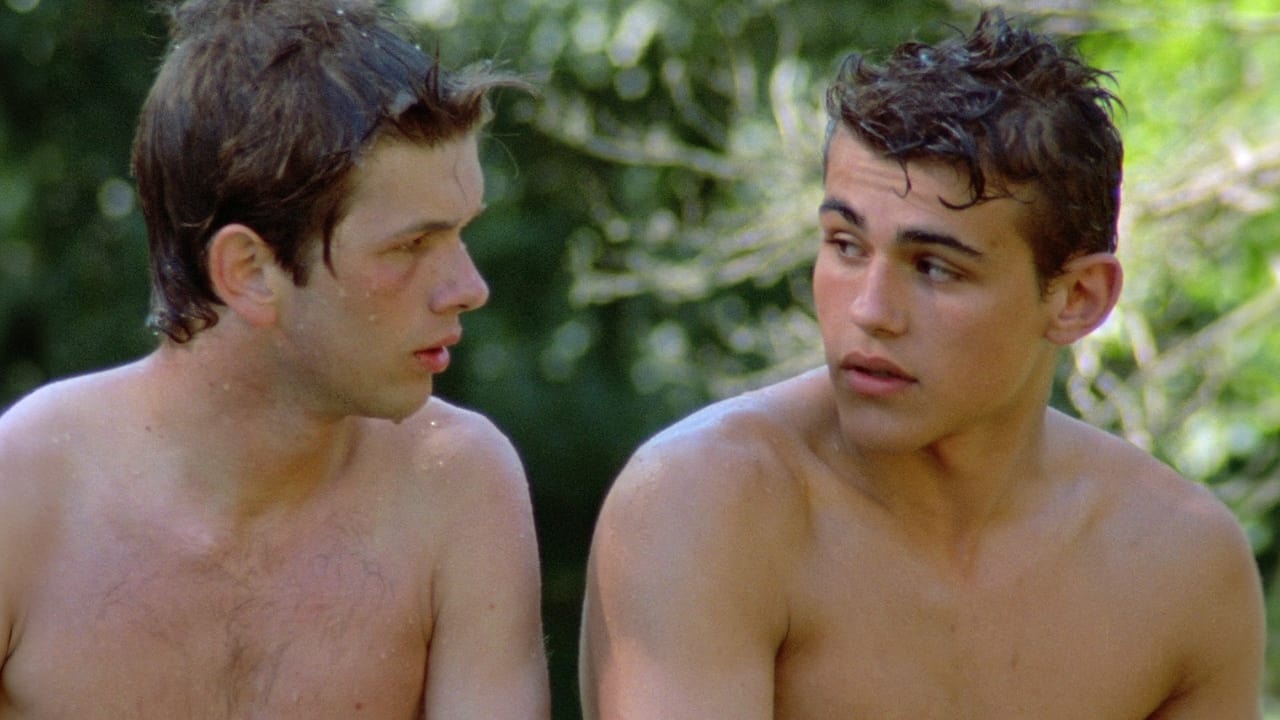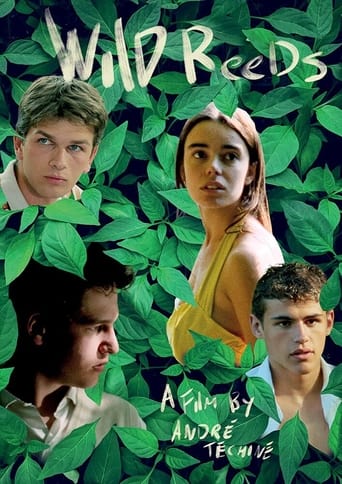

Nice effects though.
... View MoreMost undeservingly overhyped movie of all time??
... View MoreMostly, the movie is committed to the value of a good time.
... View MoreI think this is a new genre that they're all sort of working their way through it and haven't got all the kinks worked out yet but it's a genre that works for me.
... View MoreWILD REEDS is my introductory piece to André Téchiné's cinematic dominion, its title refers to famous fable THE OAK AND THE REED, and it is an adolescent quartet in 1962 France, against the backdrop of the twilight of Algerian War and the demise of French colonization.Everyone thinks 18-year-old high-schoolers Françoise (Morel) and Maïté (Bouchez) are an item, even Maïté, who is deeply influenced by her mother Madame Alvarez's (Moretti) communist slant, thinks so, they are so compatible and intimate together, although so far the relationship has been purely platonic, it is only a matter of time before it turns physical. Françoise is a lean and feeble boy, from a petit bourgeois family, he cannot do sports (swimming is an exception) by virtue of his heart condition, he knows Maïté is his soul mate, but they can never be lovers, after he is sexually aroused by his rural classmate Serge (Rideau), son of a farmer with Italian lineage and whose elder brother would later fall in battle at the front line (after being unwillingly transported back to Algeria since Madame Alvarez refuses to offer a helping hand). A boarding school bromance is burgeoning, they become close friends and Françoise comes out to Maïté, she calmly accepts it with sincere encouragement, meanwhile for Serge, his tryout with Françoise is more or less out of a young boy's curiosity, in fact, he is more interested in Maïté, who abstains form his courtship in light of Françoise. Thankfully, it is not a clichéd love triangle, instead it is a more dynamic quartet, the fourth force comes from Henri (Gorny), an Algerian-born French exile who is newly transferred to the class, he has lost his father in the war and becomes extremely cynical to the mainland bourgeois class (who is apathetic to the end of Algeria's colonization) and hostile to the radical leftists and communists (who are in favor of Algeria's independence). He is the alien, brings a radio in the class, picks on Serge and provokes Françoise for his sexuality, openly defies his teacher Madama Alvarez and reluctantly to accept the help from Monsieur Morelli (Nolot), until finally decides to drop out before the exam and by coincidence, meets Maïté in the communist headquarter in the still of the night, where her kindness thaws his malicious intention.Eventually all four gather together for an excursion near the riverside with wild reeds waving around, as they let off their most honest and profound feelings, it is also a siren call to culminate the rite-of-passage of their blazing youth. The ultimate take of a 360 degree shot sterlingly singles out the lush atmosphere with a meaningful punchline, a lyrical rendition of the precious moments in one's adolescence, feeling love, experiencing heartbreak, accepting disappointment and facing an unknown future. Téchiné magnificently teases out impressive and heartfelt performances from these four young actors, Morel, Bouchez and Gorny all rush into the top 10 tier of my yearly rank. Morel is unpolished but a pitch perfect choice for Françoise's sensitivity and integrity; Bouchez is a legitimate sensation, her Maïté, undergoes the choppiest emotional journey in the film, is utterly compelling in every frame; Gorny is detestable at first, then segues into a more sympathetic character thanks to his unfettering ire and the flitting touchiness for a wounded soul. Rideau's Serge, is offered less material to chew on apart from his jock virility, but his unaffected detachment denotes an alternative psyche in the society which hardly changes. WILD REEDS is an intimately potent prose on how a controversial political situation can erode and alter the mindset of a young generation. Remarkably, it never begin to pall from its poetic aesthetics and robust narrative. It is deservingly a capstone in Téchiné's staunch career orbit.
... View MoreThis movie is painful for gay people.This is a coming of age movie set about 1962 near Toulouse. The Algerian war is almost over.It takes place at a high school although some of the students are a bit older (21).The main character Francois is gay. He has a female friend (fag hag) Maite who is a communist (looks like a cross between Greta Van Sustren and Frieda= ugly). Francois falls in love with first Serge and then Henri...both straight. Serge is a macho peasant and Henri an upper class right wing pied noir (from Algeria).This movie has too much PC content (my all time greatest annoyance). The all around good communists Maite and her mother (would they be bad?) represent the moral high ground. The teacher helping the anti Arab Henri has an Arabic wife. Typical left wing homage you see in almost all French movies and Hollywood for that matter.This sort of political intrusion would be tolerable if the gay thing had a happy ending it doesn't and is two hours of reliving all the dead ends gay people encounter when young. The shoe salesman is a good example. It isn't much fun.There are so many better gay films. Watch the Israeli movie Eyes Wide Open or The Country Teacher instead. This one is mostly boring, the 4 main actors look too old for the role. The gay one (in one small saving grace) is the the best looking and most likable, the girl is positively homely.I long for the day when there are gay characters who beat the system and don't humiliate themselves---gay James Bonds. DO NOT RECOMMEND
... View More«Les Roseaux Sauvages» (in Portuguese, «Juncos Silvestres») isn't just an ordinary film about the awakening of adolescence: it is a romantic treatise, an unforgettable example of delicacy and fidelity in the approach of such sensible themes such as the sexual ambiguity in adolescence and, above all, the love as a superior statement, domineering - even metaphysical. Although I haven't seen much of Téchiné (I saw, besides «Les roseaux sauvages», the movies «Loin», «Les égarés», and the recent «Les temps qui changent»), I believe that, to the date, this is without a doubt his best film, the most ravishing.Téchiné tells us the story of four teenagers: François Forestier (interpreted sublimely by Gaël Morel in his eternal look of sweet innocence), Serge Bartolo (interpreted by Stéphane Rideau, the eternal seducer confirmed later in «Loin», «Presque Rien», «A toute vitesse»...), Maïte Alvarez (interpreted by the well known Élodie Bouchez) and Henri Mariani (Frédéric Gorny).The film starts with François talking to Maïte about the movie «Såsom i en Spegel» (that reports us to the idea of 'search for the real truth'), from the Swedish director Ingmar Bergman, although that isn't said. Truly, the entire film is the search for the truth by the 4 teenagers.François is Maïte's boyfriend, although that relationship is more of a platonic protection against adulthood pressures than a physical passion. At the same time, François, Serge and Henri study in the same masculine boarding school, where they share rooms. Serge, in his sexual ambiguity, desires Maïte and at the same time seduces François, and ends up having sex with him. From that day on, François faces the homosexual desires that he had yet not perceived, while he falls in love for Serge and feels excited by Henri. On its turn, Serge, although always hesitant, breaks the relationship with François to search a more peaceful village life, next to any woman that fulfills his needs. The scene where Serge first breaks with François is brutal and pungent. François, always interpreted as the most fragile and delicate of the four, meets Serge while the last is walking to the river to drown his cat's cubs. At the same time that he tells François (always sensitive) in cold blood that «they are not good for each other», he throws the innocent cubs into the river. For the first time in his life, François' heart is broken, in a scene that reminds us the archetype «the lost of innocence». From that moment on, François is always searching for fortuitous encounters with Serge, living as, in his own words, a «thieve stilling moments»: one time he travels in a motorcycle hugging Serge, in another time he sleeps next to him, etc. The scenes in the classroom are bright, solar, reminding the purity of childhood; and alternate with the scenes taken place at night, that are incredibly sensual. François is also portrayed as an intellectual that reads Jean-Arthur-Nicolas Rimbaud, a homosexual writer revolted against the world, that leaves everything to live with the also writer Paul Verlaine, while he was still a teenager. That is what François wants to be.Maïte, on her side, is a communist that, after knowing about François passion for Serge, is jealous, but finally realizes the true platonic nature of her relationship with him. After a while, she falls in love with Henri, a pied-noir (French born Algerian) teenager revolted against the situation in his native country. He is also in love with her, although ideologically they are rivals. And this is why love, in this film, is taken as a superior and dominant statement: it surpasses all human ideologies, even the most complex and rooted ones; it surpasses intellectuals who read Rimbaud and even the most practical persons. The action takes place in 1962, at the same time as the Algerian crises, that is not exploited, although, to a certain pace, it is. The soundtrack confirms the excellence of this film, with Chubby Checker giving a sixties atmosphere, and the Adagio for string by Samuel Barber yielding the dramatic dimension that the film deserves, like in the highly stylized scene where Henri his sleeping by the river, or when François travels in the motorcycle hugging Serge.In the end, François meets a shoe salesman that everyone knows his a homosexual, in a scene that represents the almost desperate search for a way to destroy the lowliness, incomprehension, and lack of role models that are destined by his sexual orientation. Although he doesn't find the answer for his problems, because there isn't one, François remains optimistic − and this is another lesson that this film teaches us: to stay in the fight, always optimistic in a future happiness.This is one of those movies where I would like to penetrate and live in forever, between Maïte, Serge, Henri and, above all, the character unifying the destiny of the four, François, 'searching the truth'. I have seen films in the come-of-age theme, but this remains my favorite. Some good ones are «Presque Rien» (with Jérémie Elkaïm and Stéphane Rideau), «A cause d'un garcon» (also with Jérémie Elkaïm), «Maurice» (based on E. M. Forster homonymous work) and «Beautiful thing».It remains to be said that this film won four César (in the Cannes festival): best film, best director, best script and best actress-revelation for Élodie Bouchez.
... View MoreI absolutely adore this movie. When I first saw it, I loved it because I could identify with the lead gay character, but I have seen it since then, and i love it now for its portrayal of the complexity of adolescence life. This is by no means part of the American teen melodrama genre. It deals with everything from homosexuality to mental illness to war to racism to feminism to communism. It has a deep political, psychological, and emotional message. I urge you to see this movie.
... View More